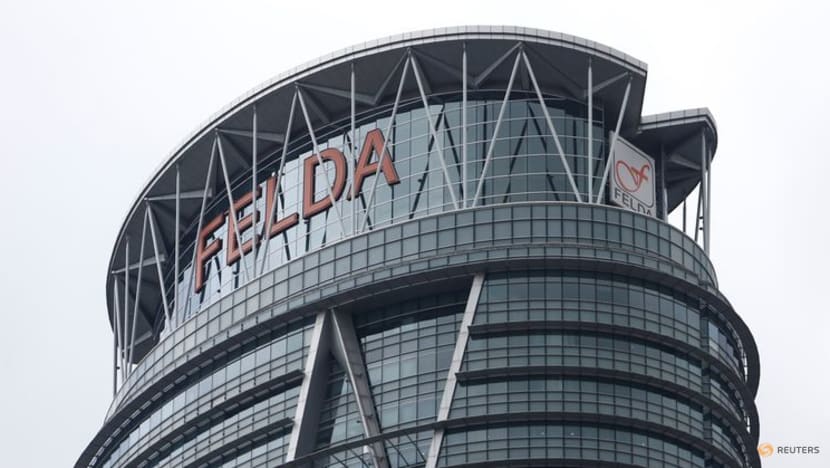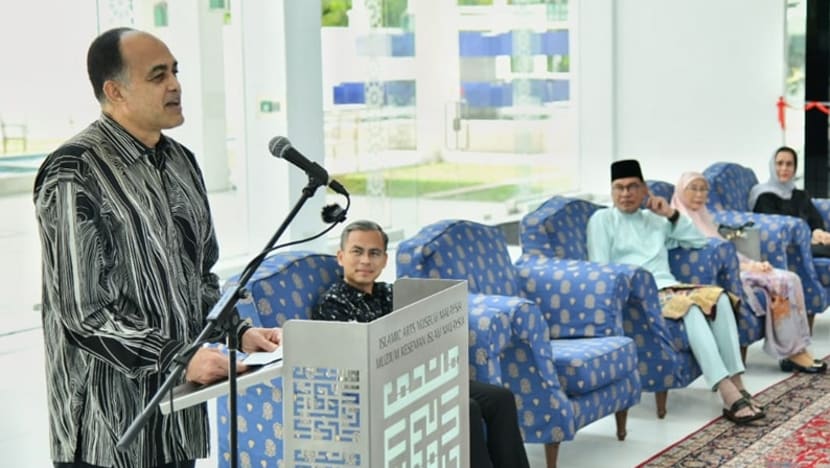analysis Asia
Suitors are courting Malaysia’s state plantation giant Felda - what this could mean for PM Anwar’s reform agenda

The logo of Felda is seen at its headquarters in Kuala Lumpur, Malaysia on Feb 7, 2018. (File photo: Reuters/Lai Seng Sin)
KUALA LUMPUR: Malaysia’s largest state-controlled plantation company Felda, a scandal-stained but unique business entity with strong political pedigree and lucrative business assets, is attracting powerful suitors, presenting Prime Minister Anwar Ibrahim with a policy challenge over his proposed reform of government-linked companies (GLCs).
The most aggressive overtures are coming from the higher echelons of the embattled United Malays National Organisation (UMNO), a junior coalition member in PM Anwar’s Pakatan Harapan (PH) coalition government, that is desperately seeking to arrest the haemorrhaging of support it has suffered in recent years with the country’s politically dominant ethnic Malay community.
Another powerful suitor for Felda is businessman Syed Mokhtar AlBukhary, whose sprawling business interests overlap with many of the sectors that Felda dominates.
Mr Syed Mokhtar, who is widely considered as one of Malaysia’s most politically connected businessmen, made a bid to take over Felda two years ago, but the proposal was rebuffed after Felda carried out a corporate exercise that shielded it from potential predators.
TWO SUITORS, TWO INTENTIONS
The two suitors circling Felda have different intentions.
UMNO’s objective is purely political. Government sources noted that party president Ahmad Zahid Hamidi - one of the two deputy prime ministers in Mr Anwar’s government - has been lobbying the premier to have Felda placed under the supervision of his Rural and Regional Development ministerial portfolio.
Felda plantations and its mostly Malay settlers who work these schemes are present in 54 parliamentary constituencies that include several dozen state assembly seats, in the 222-member lower house, making control of the corporation a very attractive political trophy, ahead for a set of six crucial state assembly elections.
Felda does not have a presence in Penang. But the plantation corporation has settlements in Kedah, Kelantan and Terengganu, which are under the control of the opposition Parti Islam SeMalaysia (PAS).
Negeri Sembilan and Selangor, which is now ruled by PH and UMNO, will also see Felda settlers play a crucial role in the polls on Aug 12 in these largely Malay-dominated states.
Mr Syed Mokhtar’s intent is purely commercial.

Government sources noted that Mr Syed Mokhtar had recently submitted a proposal to acquire Felda’s sugar refining business but the plan was rejected by PM Anwar’s government, underscoring the constant threat the plantation GLC faces from corporate predators eying its lucrative assets.
The possibility of UMNO having a major say over Felda, however, represents a clear and present concern, noted two former senior directors and current senior employees at Malaysia's oldest GLC, who spoke on condition of anonymity because of the sensitiveness of the matter.
“We have been here before and we all know the mess that was made when UMNO ran the government and Felda,” said a senior executive at the GLC’s corporate division.
In February last year, Isa Samad, a powerful UMNO warlord and former chairman of Felda, was convicted on nine charges of corruption at the plantation corporation.
Incorporated as the Federal Land and Development Authority a year before independence in 1957, Felda is Malaysia’s oldest GLC and is widely regarded by economists as one of the most successful land reform and resettlement experiments internationally.
The company successfully resettled 122,000 predominantly Malay families, who were given four hectares of land each to cultivate, across Peninsular Malaysia and Sabah on Borneo.
The experiment also carried a serious political dimension. Settlers were generally beholden to UMNO and the 54 parliamentary seats that were largely made up of Felda schemes scattered largely around Peninsular Malaysia went to the ruling party and the National Front (Barisan Nasional) coalition.
But the situation has changed radically over the last decade, largely because of serious missteps by the UMNO-led government in managing Felda that resulted in billions of dollars in losses, which in turn have burdened the settlers with debts.
Felda’s troubles stem from its ambitious public listing in 2012, which at the time only ranked as the second largely global IPO after Facebook in the same year.
By several estimates, the Felda listing raised over MYR10 billion (S$2.9 billion), with each Felda family receiving a financial bonanza of MYR15,000 and shares in the listed entity called FGV Holdings Bhd.
Flushed with cash from the public floatation, Felda’s management, which was heavily influenced by a group of board of directors that were powerful UMNO politicians, began pouring cash into highly questionable investments, ranging from hotel overseas, a highly dubious sturgeon fish rearing project, loss-making wellness and pharmaceuticals enterprise.
In all instances, Felda overpaid and these forays eventually burdened the corporation with huge debts of close to MYR10 billion that caused serious value destruction to its share prices, which currently trades at MYR1.43 a share compared to highs of over MYR4.50 when it was listed.
Corporation's settlers, who had taken personal loans to finance the purchase of shares during the 2012 public listing, are now sitting on huge losses.
“FELDA DEPOSIT” BROKEN
The mismanagement at the plantation group and the backlash from the fiasco at state-owned 1Malaysia Development Bhd (1MDB) broke the so-called “Felda deposit” with settlers turning their backs on UMNO.
It led to the fall of the Najib-led National Front government in the 2018 general election, pushing the country in the period of unprecedented political uncertainty that saw the government change hands three times before Mr Anwar took over after the national polls in November.
In early July this year, Mr Anwar’s government moved in to break the financial impasse at Felda after it agreed to provide an Islamic MYR9.9 billion debt facility, known as Sukuk, for the plantation group to restructure its debts and also resolve the funding problems faced by settlers.
Under the proposed financial restructuring facility, Mr Anwar’s government will allocate up to MYR1 billion annually for the redemption of the Felda sukuk.
A senior politician in Mr Anwar’s inner circle said that there is “general opposition to UMNO having any direct role in Felda”.
“Giving Felda back to UMNO to control is not going to win back the Malay vote,” he said, adding that getting the state plantation concern back on a strong financial footing is the better approach.
Sunway University’s Professor Yeah Kim Leng, who sits on a five-member panel advising Mr Anwar on financial matters and GLC reform, told CNA that the priority for Felda is to make sure that it is put back on a proper footing with sound professional management.
“The goal should be to bring the plantation company on par with its private sector players in terms of profitability and efficiency,” he said.
He added that for PM Anwar, the objectives for GLC reform are to set clear mandates, whether social or commercial, with no political interference.
“We have to learn from past lessons,” he added.


















